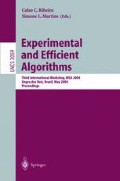Abstract
A vertex i of a graph G=(V,E) is said to be controlled by M ⊆ V if the majority of the elements of the neighborhood of i (including itself) belong to M. The set M is a monopoly in G if every vertex i ∈ V is controlled by M. Given a set M ⊆ V and two graphs G 1=(V,E 1) and G 2=(V,E 2) where E 1 ⊆ E 2, the monopoly verification problem (mvp) consists of deciding whether there exists a sandwich graph G=(V,E) (i.e., a graph where E 1 ⊆ E ⊆ E 2) such that M is a monopoly in G=(V,E). If the answer to the mvp is No, we then consider the max-controlled set problem (mcsp), whose objective is to find a sandwich graph G=(V,E) such that the number of vertices of G controlled by M is maximized. The mvp can be solved in polynomial time; the mcsp, however, is NP-hard. In this work, we present a deterministic polynomial time approximation algorithm for the mcsp with ratio \(\frac{1}{2}+ \frac{1+\sqrt{n}}{2n-2}\), where n=|V|>4. (The case n ≤ 4 is solved exactly by considering the parameterized version of the mcsp.) The algoritm is obtained through the use of randomized rounding and derandomization techniques, namely the method of conditional expectations. Additionally, we show how to improve this ratio if good estimates of expectation are obtained in advance.
Access this chapter
Tax calculation will be finalised at checkout
Purchases are for personal use only
Preview
Unable to display preview. Download preview PDF.
References
Bermond, J.-C., Peleg, D.: The power of small coalitions in graphs. In: Proc. 2nd Structural Information and Communication Complexity, Olympia, pp. 173–184. Carleton University Press, Ottawa (1995)
Dagum, P., Karp, R., Luby, M., Ross, S.: An optimal algorithm for Monte Carlo estimation. SIAM Journal on Computing 29(5), 1484–1496 (2000)
Downey, R.G., Fellows, M.R.: Fixed parameter tractability and completeness I: Basic results. In: 21st Manitoba Conference on Numerical Mathematics and Computing, Winnipeg, Canada (1991)
Dubashi, D., Ranjan, D.: Balls and bins: A study of negative dependence. Random Structures and Algorithms 13(2), 99–124 (1998)
Erdös, P., Spencer, J.: The Probabilistic Method in Combinatorics. Academic Press, San Diego (1974)
Fitoussi, D., Tennenholtz, M.: Minimal social laws. In: Proc. AAAI 1998, pp. 26–31 (1998)
Golumbic, M.C., Kaplan, H., Shamir, R.: Graph sandwich problems. Journal of Algorithms 19, 449–473 (1994)
Kaplan, H., Shamir, R.: Physical maps and interval sandwich problems: Bounded degrees help. In: Proceedings of the 5th Israeli Symposium on Theory of Computing and Systems - ISTCS, pp. 195–201 (1996); To appear in Algorithmica under the title “Bounded degree interval sandwich problems
Karmarkar, N.: A new polynomial time algorithm for linear programming. Combinatorica 4, 375–395 (1984)
Linial, N., Peleg, D., Rabinovich, Y., Saks, N.: Sphere packing and local majorities in graphs. In: Proc. 2nd Israel Symposium on Theoretical Computer Science, pp. 141–149. IEEE Computer Society Press, Rockville (1993)
Makino, K., Yamashita, M., Kameda, T.: Max-and min-neighborhood monopolies. Algorithmica 34, 240–260 (2002)
Motwani, R., Raghavan, P.: Randomized Algorithms. Cambridge University Press, London (1995)
Peleg, D.: Local majority voting, small coalitions and controlling monopolies in graphs: A review, Technical Report CS96-12, Weizmann Institute, Rehovot (1996)
Raghavan, P., Thompson, C.D.: Randomized rounding: A technique for provably good algorithms and algorithmic proofs. Combinatorica 7(4), 365–374 (1987)
Rose, J.D.: A graph-theoretic study of the numerical solution of sparse positive definite systems of linear equations. In: Reed, R.C. (ed.) Graph Theory and Computing, pp. 183–217. Academic Press, New York (1972)
Shoham, Y., Tennenholtz, M.: Emergent conventions in multi-agent systems: Initial experimental results and observations. In: Proc. International Conference on Principles of Knowledge Representation and Reasoning, pp. 225–231 (1992)
Shoham, Y., Tennenholtz, M.: On the systhesis of useful social laws for artificial agent societies. In: Proc. AAAI 1992, pp. 276–281 (1992)
Wright, S.J.: Primal-Dual Interior-Point Methods. SIAM, Philadelphia (1997)
Yannakakis, M.: Computing the minimum fill-in is NP-complete. SIAM Journal on Algebraic and Discrete Methods 2, 77–79 (1981)
Author information
Authors and Affiliations
Editor information
Editors and Affiliations
Rights and permissions
Copyright information
© 2004 Springer-Verlag Berlin Heidelberg
About this paper
Cite this paper
Martinhon, C.A., Protti, F. (2004). An Improved Derandomized Approximation Algorithm for the Max-Controlled Set Problem. In: Ribeiro, C.C., Martins, S.L. (eds) Experimental and Efficient Algorithms. WEA 2004. Lecture Notes in Computer Science, vol 3059. Springer, Berlin, Heidelberg. https://doi.org/10.1007/978-3-540-24838-5_26
Download citation
DOI: https://doi.org/10.1007/978-3-540-24838-5_26
Publisher Name: Springer, Berlin, Heidelberg
Print ISBN: 978-3-540-22067-1
Online ISBN: 978-3-540-24838-5
eBook Packages: Springer Book Archive

